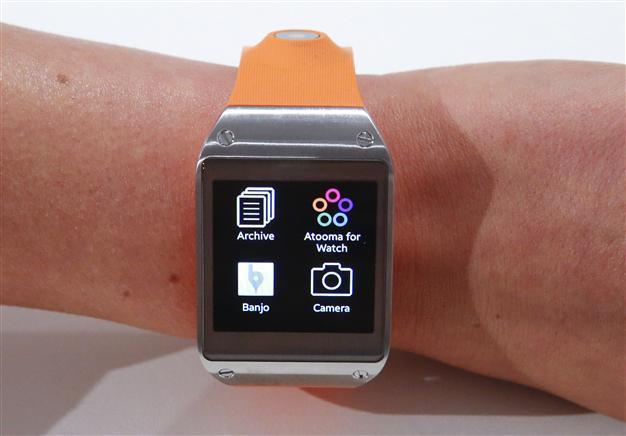Samsung unveils new smartwatch that makes calls
BERLIN - The Associated Press

A Samsung Galaxy Gear smartwatch is pictured after its launch during an event at the IFA consumer electronics fair in Berlin, September 4, 2013. REUTERS/Fabrizio Bensch
Nearly 70 years after Dick Tracy began wearing a two-way wrist radio in the funny pages, the technology that once seemed impossibly futuristic will be widely available by Christmas.Samsung on Wednesday introduced a digital watch for the holiday season that will let users check messages with a glance at their wrists and have conversations secret agent-style.
So-called smartwatches have been around for several years. But so far, they have failed to attract much consumer interest. That may change with the Samsung Galaxy Gear, which offers the company a chance to pull off the same as feat Apple did with the iPad - popularize a type of device that has lingered mostly unnoticed on store shelves.
The Gear must be linked wirelessly with a smartphone to perform its full range of functions. It acts as an extension to the phone by discreetly alerting users to incoming messages and calls on its screen, which measures 1.63 inches diagonally.
"With Gear, you're able to make calls and receive calls without ever taking your phone out of your pocket," Pranav Mistry, a member of Samsung's design team, told reporters at the launch in Berlin ahead of the annual IFA consumer electronics show here.
Sony and Qualcomm also introduced smartwatches Wednesday. Apple Inc. is expected to release its own smartwatch, though it's not clear yet when. The release of separate products from so many manufacturers could stir interest in smartwatches in general. Meanwhile, Google is working on Google Glass - a device designed to work like a smartphone and worn like a pair of glasses.
With smartphones and tablets now ubiquitous, electronics companies are trying to create a new category of products that put advanced computing technology into everyday objects such as wristwatches and glasses. Research firm Gartner projects that wearable smart electronics will be a $10 billion industry by 2016.
But Ramon Llamas, an analyst at research firm IDC, said many things have to go right for smartwatches to succeed. Llamas said the devices need to offer a range of useful applications that justify carrying around - and charging - another digital device.
"It can't just be notifications of how many incoming messages you have," he said. "Health applications seem to be the low-hanging fruit."
For starters, the Gear will work with sporting and fitness apps such as RunKeeper, which tracks runs and other workouts.
Gartner analyst Carolina Milanesi believes it ought to do more, such as monitor a user's pulse and other health information. Other sensors, she said, could also authenticate a user's identity when making payments or detect locations so users could share their whereabouts with their friends.
"The watch is smart, but not as smart as it could be," Milanesi said. "It doesn't look like Samsung pushed the envelope as much as I hope Apple will. Right now, it looks like (Gear) will just provide you with an extra screen that is more convenient to look at than to have to take out a larger device. I don't think that's what consumers want."
The Gear goes on sale in the United States and Japan next month. The rest of the world will get it sooner, on Sept. 25, with prices starting at $299. That is about twice the price of currently available devices such as the Sony SmartWatch and the Pebble, which was funded through more than $10 million pledged by individuals on fundraising website Kickstarter. Another startup, also funded through Kickstarter, hopes to launch a stand-alone watch called Omate TrueSmart that comes with built-in cell connectivity.
















